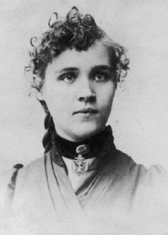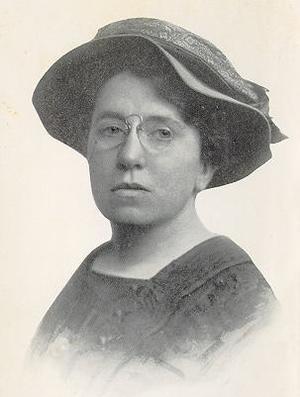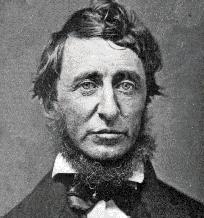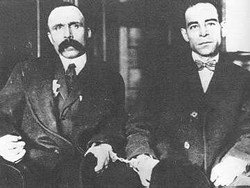Still working to recover. Please don't edit quite yet.
anarchism in the United States
| ChomskyTorrents.org has a torrent related to this aticle Anarchism in America (1983) (VHS rip) (Documentary) |
CT |
| ChomskyTorrents.org has a torrent related to this aticle The Free Voice of Labour - The Jewish Anarchists |
CT |
Anarchism in the United States spans a wide range of Anarchist philosophy. From individualist anarchism to anarchist communism and other less known forms. Individualist anarchism in the United States is strongly influenced by Henry David Thoreau, the mutualist Proudhon, as well as the egoist Max Stirner. Major thinkers, such as Josiah Warren, Lysander Spooner, and Benjamin Tucker, belong to this camp.[1][2][3]
Collectivists include Emma Goldman, a noted anarchist feminist, and Big Bill Haywood, a key member of the Industrial Workers of the World (IWW), an anarchist trade union.
>==Overview==
The origin of the American tradition draws heavily on the work of Josiah Warren, that of the German Max Stirner, and of the Frenchman Pierre Proudhon.
<br clear='all'/>
Contents
Notable Anarchists
Josiah Warren
Josiah Warren published a periodical called The Peaceful Revolutionist in 1833. Warren had participated in the collectivist experiment headed by Robert Owen called "New Harmony," but was disappointed in its failure. He stressed the need for individual sovereignty. In True Civilization Warren equates "Sovereignty of the Individual" with the Declaration of Independence's assertion of the inalienable rights. He claims that every person has an "instinct" for individual sovereignty, making individual rights inalienable and inviolate.
The labor theory holds that the value of a commodity is equal to the amount of labor required to produce or acquire it. In 1827, Warren put his theories into practice by starting a business called the Cincinnati Time Store where goods were trade was facilitated by private currency backed by labor. Warren was a strong supporter of the right of individuals to retain the product of their labor as private possessions. This position was shared by fellow anarchist Stephen Pearl Andrews.
Benjamin Tucker
Benjamin Tucker, being influenced by Warren (who he credits as being his "first source of light"), Greene, Heywood, Proudhon's mutualism, and Stirner's egoism, is probably the most famous of the American individualists. Tucker defined anarchism as "the doctrine that all the affairs of men should be managed by individuals or voluntary associations, and that the State should be abolished" (State Socialism and Anarchism).
Like the individualists he was influenced by, he rejected the notion of society being a thing that has rights, insisting that only individuals can have rights. And, like all anarchists, he opposed the governmental practice of democracy, as it allows a majority to decide for a minority. Tucker's main focus, however, was on economics. He opposed profit, believing that it is only made possible by the "suppression or restriction of competition" by government and vast concentration of wealth.
He believed that restriction of competition was accomplished by the establishment of four "monopolies": the banking/money monopoly, the land monopoly, the tariff monopoly, and the patent and copyright monopoly - the most harmful of these, according to him, being the money monopoly. He believed that restrictions on who may enter the banking business and issue currency, as well as protection of unused land, were responsible for wealth being concentrated in the hands of a privileged few.
Joseph Labadie
Joseph Labadie was an American labor organizer, individualist anarchist, social activist, printer, publisher, essayist, and poet. He first joined the Socialist Labor Party in Detroit at the age of 27. In 1883, disenchanted with socialism, Labadie embraced individualist anarchism, a non-violent doctrine. He became closely allied with Benjamin Tucker, the country's foremost exponent of that doctrine, and frequently wrote for the latter's publication, "Liberty." Without the oppression of the state, Labadie believed, humans would choose to harmonize with "the great natural laws...without robbing [their] fellows through interest, profit, rent and taxes." However, his opposition to the State was not complete, as he supported government control of water utilities, streets, and railroads (Martin). Although he did not support the militant anarchism of the Haymarket anarchists, he fought for the clemency of the accused because he did not believe they were the perpetators.
In 1888, Labadie organized the Michigan Federation of Labor, became its first president, and forged an alliance with Samuel Gompers. At age fifty he began writing verse and publishing artistic hand-crafted booklets. In 1908, the city postal inspector banned his mail because it bore stickers with anarchist quotations. A month later the Detroit water board, where he was working as a clerk, dismissed him for expressing anarchist sentiments. In both cases, the officials were forced to back down in the face of massive public protest for the person well-known in Detroit as its "Gentle Anarchist".
Voltairine de Cleyre
Voltairine de Cleyre was an individualist anarchist for several years before abandoning this label to embrace the philosophy of anarchism without adjectives. In explaining her views on anarchism she said: "Anarchism...teaches the possibility of a society in which the needs of life may be fully supplied for all, and in which the opportunities for complete development of mind and body shall be the heritage of all... teaches that the present unjust organisation of the production and distribution of wealth must finally be completely destroyed, and replaced by a system which will insure to each the liberty to work, without first seeking a master to whom he must surrender a tithe of his product, which will guarantee his liberty of access to the sources and means of production... Out of the blindly submissive, it makes the discontented; out of the unconsciously dissatisfied, it makes the consciously dissatisfied... Anarchism seeks to arouse the consciousness of oppression, the desire for a better society, and a sense of the necessity for unceasing warfare against capitalism and the State."[4]
De Cleyre was held in high esteem by many anarchists. Emma Goldman called her "the most gifted and brilliant anarchist woman America ever produced", and de Cleyre argued in Goldman's defense after Goldman was imprisoned for urging the hungry to expropriate food. In this speech, she condoned a right to take food when hungry but stopped short of advocating it: "I do not give you that advice... not that I do not think one little bit of sensitive human flesh is worth all the property rights in New York City... I say it is your business to decide whether you will starve and freeze in sight of food and clothing, outside of jail, or commit some overt act against the institution of property and take your place beside Timmermann and Goldman."
When she embraced "anarchism without adjectives", de Cleyre reasoned that: "Socialism and Communism both demand a degree of joint effort and administration which would beget more regulation than is wholly consistent with ideal Anarchism; Individualism and Mutualism, resting upon property, involve a development of the private policeman not at all compatible with my notion of freedom."
Emma Goldman
Emma Goldman was Lithuanian born, but she immigrated to the United States at seventeen. Goldman played a pivotal role in the development of anarchism in the US and Europe throughout the first half of the twentieth century. She was later deported to Russia, where she witnessed the results of the Russian Revolution. She was imprisoned in 1893 at Blackwell's Island penitentiary for publicly urging unemployedworkers that they should "Ask for work. If they do not give you work, ask for bread. If they do not give you work or bread, take bread." She was convicted of "inciting a riot" by a criminal court of New York, despite the testimonies of twelve witnesses in her defense. The jury based their verdict on the testimony of one individual, a Detective Jacobs. Voltairine de Cleyre gave the lecture In Defense of Emma Goldman as a response to this imprisonment. While serving her one year sentence, Goldman developed a keen interest in nursing.
Alexander Berkman
Alexander Berkman was a Russian writer and activist who was a leading member of the anarchist movement in the United States. Along with Emma Goldman, he led the libertarian critique of the Soviet Communist Party, denouncing what they saw as the betrayal of the revolution. While they helped persuade the main organizations of the international anarchist and anarcho-syndicalist movement not to participate in the Third International controlled by the Russians, their impact on the wider world was only partially successful.
Murray Bookchin
Murray Bookchin was an American libertarian socialist speaker and writer, and founder of the Social Ecology school of anarchist and ecological thought. He is the author of two dozen books on politics, philosophy, history, and urban affairs as well as ecology.
Murray Rothbard
Murray Rothbard was an American economist and political philosopher who is best known for theorizing anarcho-capitalism, which is a philosophy that opposes the state and supports a free market. Rothbard claims haritage in the individualist school[5] and strongly opposes anarcho-communism and other related ideologies that would prefer that wealth be distributed collectively instead of held individually. In anarcho-capitalism the individual has no obligation to any other member of the community that he does not impose on himself. In matters of security the private sector supplies protection.[6]
Henry David Thoreau
- Main article: Henry David Thoreau
Henry David Thoreau (July 12, 1817 – May 6, 1862; was an American anarchist, author, development critic, naturalist, transcendentalist, pacifist, tax resister and philosopher who is famous for Walden, on simple living amongst nature, and Civil Disobedience. [7]In 1849 Henry David Thoreau, a naturalist and anarchist wrote "I heartily accept the motto, "That government is best which governs least"; and I should like to see it acted up to more rapidly and systematically. Carried out, it finally amounts to this, which also I believe--"That government is best which governs not at all"; and when men are prepared for it, that will be the kind of government which we will have."
Albert Jay Nock
- Main article: Albert Jay Nock
Albert Jay Nock (October 13, 1870 - August 19, 1945) was an influential American individualist anarchist, libertarian author, educational theorist, and social critic of the early and middle 20th century. He was editor of the first version of The Freeman magazine, and author of many works, including the still often-cited Our Enemy, the State, cited by modern intellectuals and pundits like Murray Rothbard as a pivotal example of the ideology of individual liberty. Albert Jay Nock, a self described "philosophical anarchist", called for a laissez faire vision of society free from the influence of the political state. He described the state as that which "claims and exercises the monopoly of crime". He opposed centralization, regulation, the income tax, and mandatory education, along with what he saw as the degradation of society. He denounced in equal terms all forms of totalitarianism, including "Bolshevism, Fascism, Hitlerism, Marxism, [and] Communism", but was also harshly critical of democracy. Nock argued instead that, "[t]he practical reason for freedom is that freedom seems to be the only condition under which any kind of substantial moral fiber can be developed -- we have tried law, compulsion and authoritarianism of various kinds, and the result is nothing to be proud of." [8]
Sacco and Vanzetti
- Main article: Sacco and Vanzetti
Nicola Sacco (April 22, 1891 – August 23, 1927) and Bartolomeo Vanzetti (June 11, 1888 – August 23, 1927) were two Italian-born American anarchists, who were arrested, tried, and executed via electrocution in the American state of Massachusetts. Sacco and Vanzetti were accused of the killings of Frederick Parmenter, a shoe factory paymaster, and Alessandro Berardelli, a security guard, and of robbery of $15,766.51 from the factory's payroll on April 15, 1920. Both Sacco and Vanzetti had alibis, but they were the only people accused of the crime. As a result of what many historians feel was a blatant disregard for political civil liberties, and a strong anti-Italian prejudice, Sacco and Vanzetti were denied a retrial. Judge Webster Thayer, who heard the case, allegedly described the two as "anarchist bastards". The song "Two good men" by Woody Guthrie recounts the tale.
Contemporary anarchists
Contemporary anarchists in the United States include Fred Woodworth, Kevin Carson, Noam Chomsky, Larry Gambone, James J. Martin, John Bekken, Alexis Buss, Chuck Munson, David Graeber, Joe Peacott, Keith Preston, Crispin Sartwell, Robert Anton Wilson and John Zerzan.
Recently deceased American anarchists include Murray Bookchin and Sam Dolgoff.
Although neither claim to be anarchists, both Howard Zinn and Ward Churchill incorporate anarchist beliefs into their politics and have connections with the anarchist movement.
Conflicts within Anarchism in the United States
There has been much debate on whether individualist anarchism is properly justified in natural law or egoism. Josiah Warren and Lysander Spooner based their philosophical system on inalienable natural rights, while others such as Benjamin Tucker believed that rights can only exist by contract. Tucker said: "I see no reason, as far as moral obligation is concerned, why one [man] should not sub-ordinate or destroy the other. But if each of these men can be made to see that the other's free life is helpful to him, then they will agree not to invade each other; in other words, they will equalize their existences, or rights to existence by contract. . . Before contract is the right of might. Contract is the voluntary suspension of the right to might. The power secured by such suspension we may call the right of contract. These two rights -the right of might and the right of contract -are the only rights that ever have been or ever can be. So-called moral rights have no existence."
Many individualist anarchists oppose the Lockean conception of property in land, which maintains that if an individual mixes his labor with land, it becomes his property even if he ceases using it. It was Benjamin Tucker's position that an individual could only have title to land so long as he continually uses it. Lysander Spooner, however, accepted the Lockean conception and did not require any condition of "occupancy and use." This was a source of some conflict between Tucker and Spooner, with Tucker expressing dissatisfaction with the latter's position on land. (Spooner Vs. Liberty, Carl Watner) Josiah Warren also did not place occupancy and use restrictions on the ownership of land.
While all anarchists rejected the state communism advocated by Karl Marx, individualists had a particular focus on the primacy of the individual. For example, Benjamin Tucker argued that Marx sought to make the government everything and the individual nothing.[9] However, while they reject communism, many individual anarchists refer to their philosophy as a form of socialism.[10] Some even participated in the International Workingmen's Association, or "First International." Tucker joined many anarcho-communists in arguing that profit was exploitation, "bottom claim of Socialism [is] that labor should be put in possession of its own."[11] For example, anarcho-communist Peter Kropotkin asserted that, "so long as Socialism was understood in its wide, generic, and true sense -- as an effort to abolish the exploitation of Labour by Capital -- the Anarchists were marching hand-in-hands with the Socialists of that time."[12] According to individualist Ken Knudson, the anarcho-communists believe that goods should be distributed "according to need" instead of according to labor, in contrast to what Tucker and the other individualists believed. He argues that individualists think this anarcho-communist position is unfair to the laborer who produces goods but only receives what he "needs" rather than what he has produced. Instead of going into a collectivized pool of goods distrubuted according to need, everything an individual produces becomes his property (either the good itself or the wage received). He then decides who to sell his produce to and for how much. [1] Tucker believed that the lack of banking regulations would increase the supply of money, increase the competition in lending it, and therefore result in the elimination of profit by reducing the interest rate to zero.
Economist and anarcho-capitalist Murray Rothbard, also favoring unregulated banking, argues that the "Spooner-Tucker Doctrine" of free banking shows a flawed understanding of economics. He says that interest rates are "not simply the price of money," so are not determined by the supply of money but by time value of money. Thus, he claims that interest/profit would still be widespread in a free banking environment. Rothbard believes that the labor theory of value, as well as Tucker's application of it, is erroneous and that "far from being exploitation [of workers], capital investment and the interest-profit system is an enormous boon to them and to all of society." He says, "it has been particularly distressing to me as an ardent admirer of Spooner and Tucker to find that their followers have emphasized and concentrated on their totally fallacious monetary views almost to the exclusion of all else and even bring them forth as a panacea for all economic and social ills." [2]
See also
- Henry David Thoreau
- Mutualism (economic theory)
- Cincinnati Time Store
- Individualist anarchism
- Liberty (1881-1908)
- Anarchism in the English tradition
- Anarchism and anarcho-capitalism
- Labor theory of property
anarchism in: Antigua and Barbuda • Bahamas • Barbados • Belize • Canada • Costa Rica • Cuba • Dominica • Dominican Republic • El Salvador • Grenada • Guatemala • Haiti • Honduras • Jamaica • Mexico • Nicaragua • Panama • Saint Kitts and Nevis • Saint Lucia • Saint Vincent and the Grenadines • Trinidad and Tobago • United States
Territories: Anguilla • Aruba • Bermuda • British Virgin Islands • Cayman Islands • Greenland • Guadeloupe • Martinique • Montserrat • Navassa Island • Netherlands Antilles • Puerto Rico • Saint-Pierre and Miquelon • Turks and Caicos Islands • U.S. Virgin Islands
Notes
- ↑ Madison, Charles A., 1945, "Anarchism in the United States", Journal of the History of Ideas,volume 6, issue 1, pages 46-66
- ↑ Madison, Charles A., 1943, "Benjamin R. Tucker: Individualist and Anarchist", New England Quarterly, volume 16, issue 3, pages 444-467
- ↑ Rocker, Rudolf, 1949, Pioneers of American Freedom: Origin of Liberal and Radical Thought in America, Rocker Publications Committee, Los Angeles, Calif
- ↑ de Cleyre, Voltairine (1907) McKinley's Assassination from the Anarchist Standpoint"
- ↑ Murray Rothbard, The Origins of Individualist Anarchism in the US, http://www.mises.org/story/2014
- ↑ William Outhwaite, The Blackwell Dictionary of Modern Social Thought, 2nd edition, 2002, Blackwell Publishers, Malden, MA, ISBN 0631221646
- ↑ Civil Disobedience ISBN 1557094179 (1849)
- ↑ "On Doing the Right Thing", The American Mercury, 1925
- ↑ State Socialism and Anarchism: "Just as the idea of taking capital away from individuals and giving it to the government started Marx on a path which ends in making the government everything and the individual nothing, so the idea of taking capital away from government-protected monopolies and putting it within easy reach of all individuals started Warren and Proudhon in a path which ends in making the individual everything and the government nothing....though opposed to socializing the ownership of capital, they aimed nevertheless to socialize its effects by making its use beneficial to all instead of a means of impoverishing the many to enrich the few."
- ↑ http://www.blackcrayon.com/page.jsp/library/tucker/tucker37.htm
- ↑ Tucker, Benjamin R. (1886) State Socialism and Anarchismhttp://flag.blackened.net/daver/anarchism/tucker/tucker2.html
- ↑ Kropotkin, Peter "Evolution and Environment" from Modern Science and Anarchism [p. 81]
External links
- State Socialism and Anarchism: How far they agree, and wherein they differ, Economic Rent and Liberty, Land, and Labor by Benjamin Tucker
- The Boston Anarchists by Henry Appleton
- Bibliographical Essay by James J. Martin from his book Men Against the State: The Expositors of Individualist Anarchism in America, 1827-1908
- Benjamin R Tucker & the Champions of Liberty: A Centenary Anthology edited by Edited by Michael E. Coughlin, Charles H. Hamilton and Mark A. Sullivan
- Ingalls, Hanson, and Tucker: Nineteenth Century American Anarchists by Jack Schwartzman
- Manifesto, Plan of the Cincinnati Labor for Labor Store and Equitable Commerce by Josiah Warren
- Mutual Banking by William B. Greene
- Uncivil Liberty: An Essay to Show the Injustice and Impolicy of Ruling Woman Without Her Consent (1873) by Ezra Heywood
- The Law of Intellectual Property: or an essay on the right of authors and inventors to a perpetual property in their ideas. by Lysander Spooner, 1855
- Henry Bool’s Apology for His Jeffersonian Anarchism by Henry Bool, 1901
- Anarchist Socialism and Anarchist-Mutualism by John William Lloyd, contributor to Liberty and one-time individualist anarchist, who tried to reconcile individualist and communist anarchism
- Individualism Reconsidered and An Overview of Individualist Anarchist Thought by Joe Peacott
- The Iron Fist Behind the Invisible Hand: Corporate Capitalism As a State-Guaranteed System of Privilege by Kevin A. Carson
- Individualist Anarchist Society of UC Berkeley
| This article contains content from Wikipedia. Current versions of the GNU FDL article en:Anarchism in the United States on WP may contain information useful to the improvement of this article | WP |





